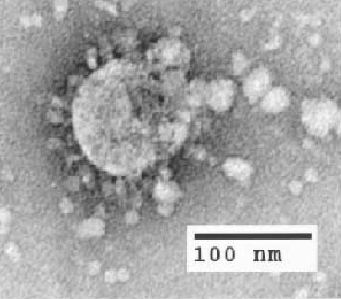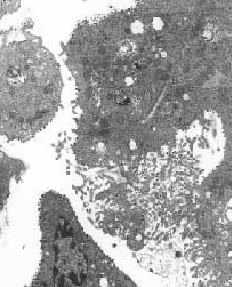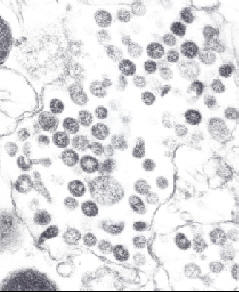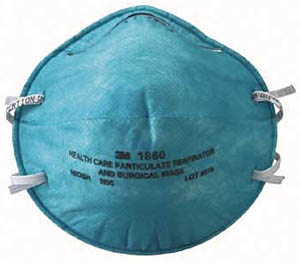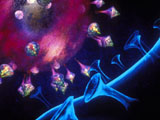|
SARS |
|||||
|
Ernstig acuut luchtwegensyndroom |
|||||
| NEWS: Dutch Virologist Ab Osterhaus finds anti-SARS medicine "PegIntron" 22-02-2004 peg-intron | |||||
|
Worldwide, the number of SARS cases
continues to climb with over 8,437
infections and
813 deaths reported from 28 countries,
WHO says.
peg-intron
PegIntron |
DISEASE FATALITY RATES Rates are expressed in percentages % |
||||
|
Ebola Smallpox Gastrointestinal anthrax Cutaneous anthrax Dengue hemorrhagic fever Yellow fever Bubonic plague SARS Meningoccal disease (only US) West Nile virus Tetanus Diphtheria Typhoid fever Rocky Mountain spotted fever |
36 to 88 30 25 to 60 20 20 20 15.4 15 12 12 11 10 10 5.2 |
||||
|
|
Sources: Centers for Disease Control and Prevention, World Health Organization state and national public health departments, university research centers |
||||
|
|
|||||
Voor de Nederlandstalige lezers hebben we enkele handige links en info halverwege deze pagina: Afbeelding/Picture van/of SARS |
|||||
|
|
|||||
|
ē What are the symptoms?
The main symptoms of severe acute respiratory syndrome (SARS) are high fever (greater than 38 C or 100.4 F), combined with a dry cough, shortness of breath, or breathing difficulties. Chest X-ray indicates changes compatible with pneumonia. Other possible symptoms include headache, muscular stiffness, loss of appetite, malaise, confusion, rash and diarrhea. ē How contagious is SARS? SARS appears to be less infectious than influenza. Experts believe it spreads through close contact with an infected person, such as between family members or between patient and doctor. However, it is still unknown what sort of virus or bacteria causes the illness. Scientists are focusing on the coronavirus family, which causes common colds, although other possibilities are also being explored. The incubation period -- i.e. the length of time between exposure and symptoms emerging -- is estimated to range from two to seven days. ē How is it treated? The best treatment is still unclear. Standard antiviral drugs and antibiotics do not appear to be effective although some patients in Hong Kong have shown favorable response to a cocktail of drugs including the antiviral drug ribavirin and steroids. ē What can be done to prevent SARS? The illness can be severe but apart from the close contact with an infected patient is not thought to be highly contagious when simple protective precautions are taken. Health experts say it is important to maintain good personal hygiene and good ventilation in home and working environments. Washing hands with liquid soap and using disposable towels is recommended. Keeping windows open and putting on facemasks can also help prevent transmission of the infection. ē Is it safe to travel? The World Health Organization (WHO) has advised travellers heading for Hong Kong and the southern Chinese province of Guangdong to postpone non-essential travel to those areas because of the outbreak. Check their Web Site for latest alerts and advisories. U.S. and Canadian health officials also say travelers should consider postponing non-essential trips to areas at risk such as Hanoi, Vietnam; Hong Kong or Guangdong province in southern China; and Singapore. WHO recommends those who have symptoms related to SARS and have a recent history of travel to the affected areas seek immediate medical attention and inform health care staff of recent travel. ē How many cases have been reported worldwide? More than 4,000 cases of SARS have been reported so far. To see the breakdown of latest number of cases and deaths by country, click here. (Sources: World Health Organization; U.S. Centers for Disease Control and Prevention; Health Canada; Hong Kong Department of Health) Editor's note: The above information should be used for guidance only and should not be considered a substitute for professional medical advice
|
|||||
Severe Acute Respiratory
Syndrome links
Related News/nieuws: Ebola death toll reaches 120 on April 2003. Meer/more afbeeldingen/pictures van/of S.A.R.S. |
|||||
|
|
|||||
|
Vanaf hier uitsluitend
Nederlandstalige info en links
naar belangrijke SARS pagina's: |
|||||
|
stand van zaken 8 juli 2003 SARS is een tot voor kort onbekende, besmettelijke luchtweginfectie. Op 26 februari 2003 is de eerste diagnose gesteld bij een patiŽnt in Hanoi, Vietnam. Op 11 juli rapporteerde de WHO 8.437 verdachte gevallen, waarvan er 813 zijn overleden. Oorzaak Het lijkt nu
zeker dat de ziekte wordt veroorzaakt door een
coronavirus, BesmettingHet is (nog) niet bekend op welke manier de ziekte wordt overgebracht. Men vermoedt dat druppelinfectie zoals hoesten en niezen in ieder geval een rol speelt. De meeste patiŽnten zijn werkzaam in de gezondheidszorg. Het resterende deel bestaat voornamelijk uit gezins- en familieleden en heeft op een andere manier intensief contact gehad met een zieke. Het lijkt er dan ook op, dat de ziekte niet wordt overgebracht bij een vluchtige ontmoeting en minder sterk besmettelijk is dan griep. De incubatietijd wordt geschat op 2 tot 5/7 dagen. SymptomenDe eerste verschijnselen lijken op griep: koorts > 38ļ C, lichte keelpijn, spierpijn, hoofdpijn en hoesten. Een aantal mensen ontwikkelt een ernstige longontsteking met kortademigheid en ademhalingsproblemen. DiagnoseOp grond van de symptomen, de ziektegeschiedenis en een longfoto wordt de diagnose gesteld. Hoewel nu bekend is dat de verwekker een virus is, moet voor de ontwikkeling van een specifieke diagnostische test precies bekend zijn om wťlk virus het gaat. Zover is het nog niet. Inmiddels is SARS een "A" ziekte geworden, hetgeen betekent dat een vermoedelijk geval direct aan de GGD gemeld moet worden. BehandelingOmdat de oorzaak van de ziekte nog niet bekend is, is een gerichte therapie nog niet beschikbaar. Blijkt het inderdaad een virus te zijn, dan zullen antibiotica in eerste instantie niet helpen, maar bepaalde antivirale middelen misschien wel. Deze kunnen echter alleen in een ziekenhuis worden toegediend. Als door de verzwakte weerstand ook bacteriŽn het lichaam aantasten kunnen antibiotica wel een rol spelen. IsolatieAlle patiŽnten worden onder strikte isolatie opgenomen in het ziekenhuis. VerspreidingDe ziekte komt vooral voor in Vietnam, Hong Kong, Singapore en China (provincie Guangdong). De zieken in Zuid-Oost AziŽ hebben allen in nauw contact gestaan met SARS-patiŽnten. Er zijn verdachte ziektegevallen gemeld in andere landen (AustraliŽ, BelgiŽ, Canada, Duitsland, Frankrijk, ItaliŽ, Ierland, RoemeniŽ, Thailand, Taiwan, Verenigd Koninkrijk, de Verenigde Staten en Zwitserland), maar deze zijn stuk voor stuk terug te voeren op intensieve contacten met mensen in de verspreidingsgebieden. Lokale verspreiding heeft tot nu toe alleen plaatsgevonden in Canada, waar familieleden of behandelaars het slachtoffer zijn geworden. WHODe Wereldgezondheidsorganisatie heeft alle landen gevraagd om alert te zijn en mogelijk verdachte gevallen te rapporteren. Op vliegvelden wordt extra aandacht geschonken aan zieken met luchtwegverschijnselen en koorts om zodoende verspreiding in een nieuw land te voorkomen. Ministerie van VWS
|
|||||
MedWeb Nieuws Donderdag 20 maart 2003 ... arts bracht longziekte naar Hongkong HONGKONG/PEKING (DPA) - De mysterieuze Aziatische longontsteking SARS (Severe Acute Respiratory Syndrome), die zich via ... www.medweb.nl/member/news/06d20nie.htm
Media Center
Nederlands Kenniscentrum Arbeid en Longaandoeningen - Opgelucht ...
Ministerie van Buitenlandse Zaken
Mogelijk ook SARS in BelgiŽ
Belgisch
Centrum voor Farmacotherapeutische Informatie (BCFI vzw ...
Welcome to VIW
Devices Alert - SARS - NL (main-frame)
Nederlandse ambassade Peking Nieuws
|
|||||
|
|||||
|
|
|||||
|
www.s-a-r-s.info
www.dodelijkvirus.be
zie ook
www.griepvirus.be
en
www.pest.be
www.severeacuterespiratorysyndrome.be www.severe-acute-respiratory-syndrome.info www.severe-acute-respiratory-syndrome.org
|
|||||

